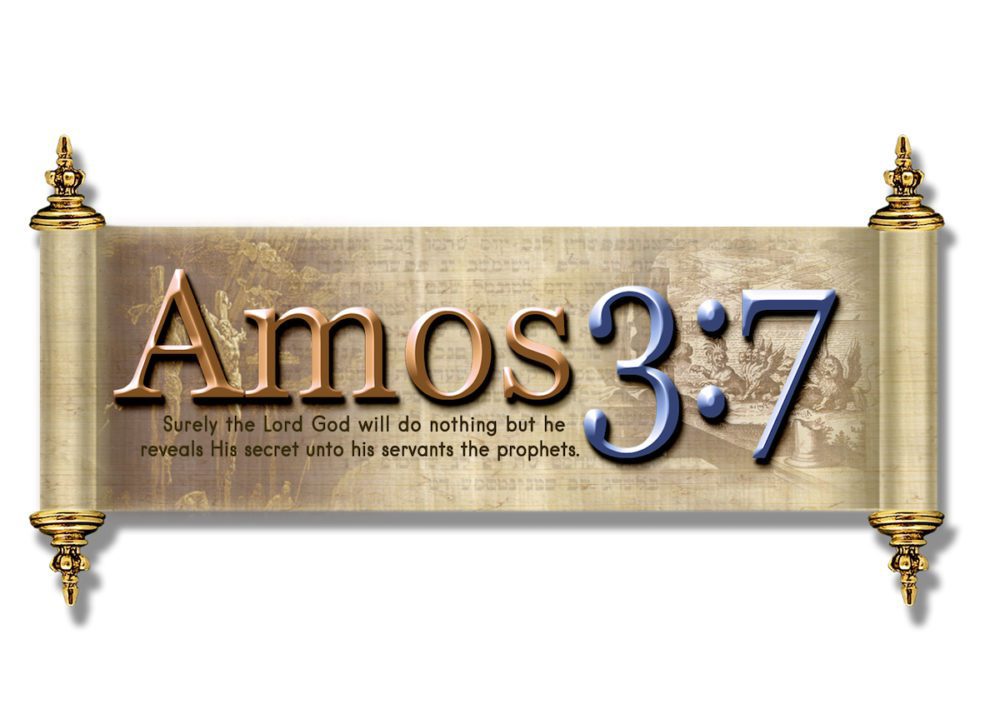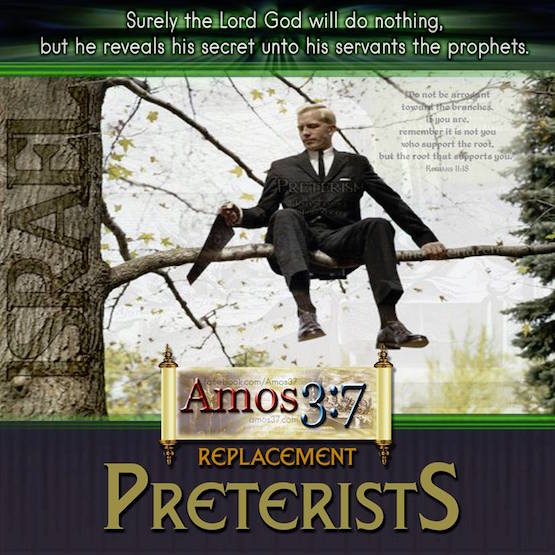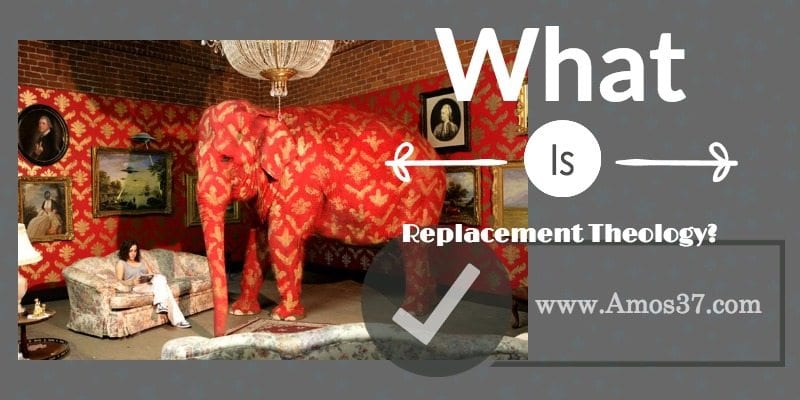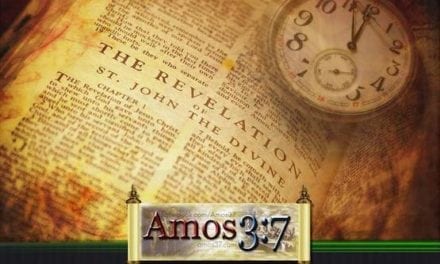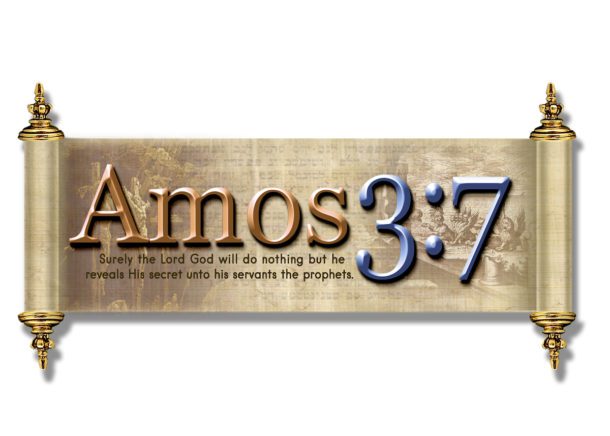Again today as we here at Amos37 prepare our series on Replacement Theology. We offer Dr. Thomas Ice brief definition of both sides of the aisle on this issue. Why bother with such a discussion. One for me is it shows the absolute failure of the Church on those who hold to a replacement view of Israel. It shows a gross ignorance of the plan of God for the world, not just Israel. Ultimately this view leads to anti-Semitism inside the Church!
Finally, it binds the Church to Gods to plan to deal with the Jewish people that Gabriel gave Daniel Gods timeline for dealing with Israel, Jerusalem and make an end of sin. This is a fruitful study as we look to Gods word for answers. We believe here that this is a very grave issue that will suck the apostate Church into judgment.
Get it informed and help the Church to understand this issue. Love fulfills the law.
Dr. Thomas Ice
What Is Replacement Theology?
Replacement theology “is the view that the church is the new or true Israel that has permanently replaced or superseded Israel as the people of God.” 1 Another term for replacement theology—one often found in academic circles—is supersessionism.
[bctt tweet=”What is Replacement Theology? Is God done with Israel? Is God a Liar?! Come n See”]
Replacement theology has been the fuel that has energized medieval anti-Semitism, Eastern European pogroms, the Holocaust and contemporary disdain for the modern state of Israel. Mike Vlach notes: “The acceptance or rejection of supersessionism may also influence how one views the modern state of Israel and events in the Middle
East.”2 Wherever replacement theology has flourished, the Jews have had to run for cover.
Big Problems with Preterism & Hank Hanegraaf Response
Hank Hanegraaff: A Gospel Response to Christian Zionism
Preterist DEFINITION AND DESCRIPTION
Preterist and covenant theologian Kenneth Gentry defines replacement theology—to which he holds—as follows:
“We believe that the international Church has superseded for all times national Israel as the institution for the administration of divine blessing to the world.”3 We dispensationalists believe the Church is the current instrument
through which God is working in this age, but God has a future time in which He will restore national Israel “as the institution for the administration of divine blessing to the world.” Gentry adds to his initial statement the following embellishment:That is, we believe that in the unfolding of the plan of God in history, the Christian Church is the very fruition of the redemptive purpose of God. As such, the multiracial, international Church of Jesus Christ supersedes racial, national Israel as the focus of the kingdom of God. Indeed, we believe that the Church becomes “the Israel of God” (Gal. 6:16), the “seed of Abraham” (Gal. 3:29), “the circumcision” (Phil. 3:3), the “temple of God” (Eph. 2:19-22), and so forth. We believe that Jew and Gentile are eternally merged into a “new man” in the Church of Jesus Christ (Eph. 2:12–18). What God hath joined together let no man put asunder!4
Walt Kaiser tells us that replacement theology, “declared that the Church, Abraham’s spiritual seed, had replaced national Israel in that it had transcended and fulfilled the terms of the covenant given to Israel, which covenant Israel had lost because of disobedience.”5 European scholar, Ronald Diprose, defines replacement theology as follows: “the Church completely and permanently replaced ethnic Israel in the working out of God’s plan and as recipient of Old Testament promises addressed to Israel.” It appears that supersessionists believe that Israel is a “has been” and has no future in the plan of God. The Church inherits all the blessings, while Israel is meant to endure only curses.
THE RISE OF REPLACEMENT THEOLOGY
Replacement theology has been “the consensus of the church from the middle of the second century A.D. to the present day, with few exceptions.”6 Even though the ante-Nicene fathers were predominately premillennial in their understanding of future things, they laid a groundwork that would lead to the rise and development of replacement theology. Premillennialist Justin Martyr was the first to view “the Christian church as ‘the true spiritual Israel’ (Dial. 11)”7 around A.D. 160. Justin’s views laid the groundwork for the growing belief that the Church had superseded or replaced Israel. “Misunderstanding of it colours the Church’s attitude to Judaism and contributes to anti-Semitism,” notes Peter Richardson.8 He adds, “In spite of the many attributes, characteristics, prerogatives of the latter which are applied to the former, the Church is not called Israel in the NT. The continuity between Israel and the Church is partial; and the discontinuity between Israel B.C. and its continuation A.D. is partial.”9
Further, by the time of Irenaeus, it becomes entrenched in Christian theology that “the bulk of Israel’s Scriptures [are] indecisive for the formation of Christian doctrine.”10 Soulen continues: “In addition to narrowing the thematic focus of the Hebrew Scriptures to the problem of sin and redemption, the standard model also foreshortens the Hebrew Scriptures into a temporal sense. As perceived through the lens of the standard model, the Hebrew Scriptures do not relate a story that extends indefinitely into the future.”11 Kaiser paints the following developmental picture in the early Church:
Replacement theology is not a new arrival in the theological arena, for it probably has its origins in an early political-ecclesiastical alliance forged between Eusebius Pamphilius and Emperor Constantine. Constantine, regarding himself as God’s representative in his role as emperor, gathered all the bishops together on the day of his tricennalia (30th anniversary of his reign), an event, incidentally, which he saw as the foreshadowing of the eschatological Messianic banquet. The results of that meeting, in Eusebius’mind, made it unnecessary to distinguish any longer between the Church and the Empire, for they appeared to merge into one fulfilled kingdom of God on earth in the present time. Such a maneuver, of course, nicely evacuated the role and the significance of the Jewish people in any kingdom considerations. Here began the long trail of replacement theology. 12
The details about Israel’s future, especially in the Old Testament, are simply missing as a part of the development of Christian theology. Jeffrey Siker cites this issue as the primary reason for the disinheriting of the Jews within the early Christian Church. “The first factor is the diminishing emphasis upon the eschatological dimensions of the Christian faith.”13
THE IMPACT OF REPLACEMENT THEOLOGY
“The doctrine of replacement theology reflects a wide range of Christian thinking,” notes Menachem Benhayim. “From utterly malignant anti-Jewish hatred to simple misunderstanding and misapplication of biblical texts.”14 Since Israel is a subject found on just about every page of the Old and New Testaments, to get that subject wrong can only lead to a mega-distortion of Scripture. This has indeed been the case throughout the history of the Church.
Paul says in Romans 11:7–8, “But if some of the branches were broken off, and you, being a wild olive, were grafted in among them and became partaker with them of the rich root of the olive tree, do not be arrogant toward the branches; but if you are arrogant, remember that it is not you who supports the root, but the root supports you.” Yet, this history of most during the Church Age has been an attitude of arrogance toward God’s wayward, chosen people—Israel.
Such an attitude of arrogance has led to a distortion of so many biblical teachings. The Church often allegorizes many portions of the Bible, both Old and New Testaments, in order to teach that since the time of Christ Israel has no claim to the land of Israel. Replacement theologian Colin Chapman obfuscates the issue as follows: “the coming of the kingdom of God through Jesus the Messiah has transformed and reinterpreted all the promises and prophecies in the Old Testament. . . . Jesus the Messiah, who lived, died and was raised from death in the land, has opened the kingdom of God to people of all races, making all who follow him into ‘one new humanity’ (Ephesians 2:15, NRSV).”15 As Hebrew Christian Arnold Fruchtenbaum is fond of saying, “While the Church is said to be a partaker in Israel’s promises in the New Testament, nowhere is she said to be a taker over of Israel’s promises.”
CONCLUSION
“Replacement theology is just plain bad news for both the Church and Israel,”16 declares Kaiser. Not only does the Bible distinguish between God’s plan for Israel and His plan for the Church, but it also teaches a distinction between saved and lost Jewish individuals. This is one of the things denied by replacement theology. British commentator C. E. B. Canfield, who is by no means a Bible-thumping fundamentalist (a rare moment in academia), provides the following appropriate apology:
It is only where the Church persists in refusing to learn this message, where it secretly—perhaps quite unconsciously!—believes that its own existence is based on human achievement, and so fails to understand God’s mercy to itself, that it is unable to believe in God’s mercy for still unbelieving Israel, and so entertains the ugly and unscriptural notion that God has cast off His people Israel and simply replaced it by the Christian Church. These three chapters [Romans 9—11] emphatically forbid us to speak of the Church as having once and for all taken the place of the Jewish people… But the assumption that the Church has simply replaced Israel as the people of God is extremely common… And I confess with shame to having also myself used in print on more than one occasion this language of the replacement of Israel by the Church. 17
Yet, today, even some evangelicals are attempting to develop new reasons to replace Israel with the Church. May God help us all to understand His Scripture more clearly! Maranatha!
ENDNOTES
1 Michael J. Vlach,“The Church as a Replacement of Israel: An Analysis of Supersessionism,” (PhD dissertation at Southeastern Baptist Theological Seminary, Wake Forest, NC, 2004), p. xv.
2 Vlach,“Replacement of Israel,”p. 10.
3 Kenneth L. Gentry, Jr., “Supersessional Orthodoxy; Zionistic Sadism,” Dispensationalism in Transition, Vol. VI, No. 2; Feb. 1993, p. 1.
4 Kenneth L. Gentry, Jr., “The Iceman Cometh! Moronism Reigneth!,” Dispensationalism in Transition, Vol. VI, No. 1; Jan. 1993, p. 1.
5 Walter C. Kaiser, Jr., “An Assessment of ‘Replacement Theology,’”Mishkan (No. 21; 1994), p. 9.
6 H.Wayne House,“The Church’s Appropriation of Israel’s Blessings” in H.Wayne House, editor, Israel: The Land and the People (Grand Rapids: Kregel, 1998), p. 77.
7 R. Kendall Soulen, The God of Israel and Christian Theology (Minneapolis: Fortress Press, 1996), p. 35.
8 Peter Richardson, Israel In The Apostolic Church (Cambridge:At The University Press, 1969), p. 2.
9 Richardson, Israel, p.7.
10 Soulen, God of Israel, p.50
11 Soulen, God of Israel, p. 53
12 Kaiser,“Replacement Theology,”p. 9.
13 Jeffrey S. Siker, Disinheriting The Jews: Abraham in Early Christian Controversy (Louisville, KY: Westminster/John Knox Press, 1991), p. 194.
14 Menachem Benhayim, “The Church Has Replaced the Jewish People—A Response,” Mishkan (No. 21; 1994), p. 31.
15 Colin Chapman, Whose Promised Land? The Continuing Crisis Over Israel and Palestine (Grand Rapids: Baker, 2002), p. 285.
16 Kaiser,“Replacement Theology,”p. 20.
17 C. E. B. Cranfield, A Critical and Exegetical Commentary on The Epistle to The Romans, 2 vols. (Edinburgh:T & T Clark, 1979), vol. 2, p. 448.
Connect with Amos37
Stay up to date with Amos37.com eMail update (Weekly)
